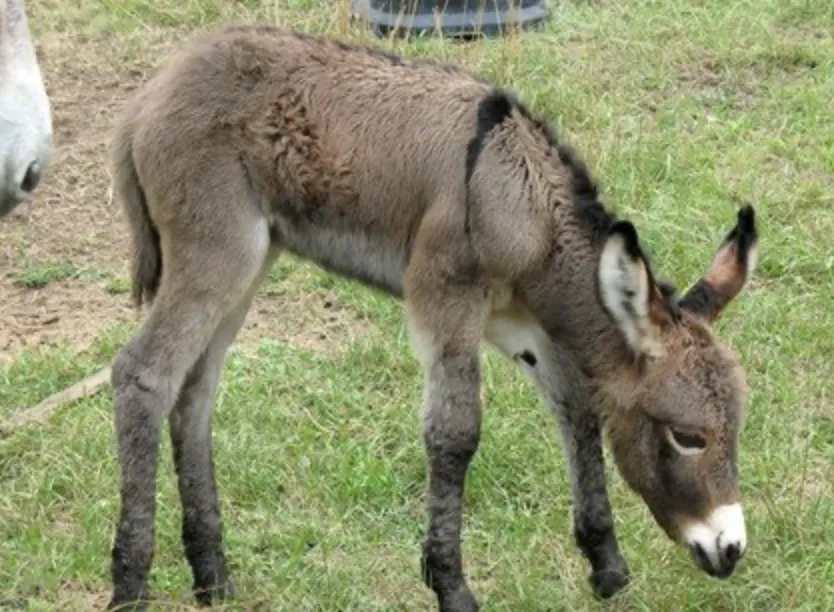
Baby Donkey
by: Marina Santos
Did you know donkey’s ears are not only incredible at picking up sound, but they can also tell you how they are feeling?
Overview:
The domestic donkey originated in Africa, followed by further expansion in that continent and Eurasia and eventual return to Africa.
They are all members of the family 'equus’, the genus of mammals in the family Equidae, which includes horses, donkeys, and zebras.
Wild donkeys are found in deserts and savannas in northern Africa from Morocco to Somalia, in the Arabian Peninsula and in the Middle East.
When used as equine, pasture is beneficial for donkeys as it allows movement, which is important for their overall health.
Physical description: Donkeys typically stand between 36 to 56 inches (91 to 142 cm) tall at the shoulder. Donkeys have a short, dense coat that varies in color from gray, brown, black, or white. Some donkeys may have a mixture of colors or distinctive markings such as stripes on their legs or a dorsal
stripe along the back. Like other equids, donkeys have hypsodont teeth, meaning their teeth continue to grow throughout their life to compensate for wear from grazing. They also have tough, durable hooves that are well-suited for traversing various terrains.
Diet and Eating Habits: Donkeys are herbivores with a diet primarily consisting of roughage, such as grasses, hay, and other fibrous vegetation. They have a slow and deliberate eating style, often taking small, frequent bites of vegetation throughout the day. Their large intestine is relatively long and complex, allowing for the fermentation of cellulose by beneficial bacteria. However, donkeys are sensitive to sudden changes in diet and should be introduced gradually to new foods to prevent digestive upset or colic.
Behavior and Personality: Donkeys are intelligent animals that are known for their astute observation skills and can quickly learn from their environment and experiences. They are social animals that form strong bonds with their herd mates, including other donkeys, horses, or even humans. These animals can form deep connections with their human caregivers and are known to be empathetic and responsive to the emotions of those around them, offering comfort and companionship during times of distress.
Domestication and Uses: Donkeys were first domesticated in northeastern Africa, likely in present-day Egypt or Sudan, around 5,000 to 6,000 years ago. Their sturdy build, surefootedness, and ability to carry heavy loads make them well-suited for transporting goods, equipment, and supplies in rural and mountainous regions where wheeled vehicles may be impractical. Because they are effective grazers, donkeys play a vital ecological role in helping control vegetation growth and prevent the spread of invasive plant species, particularly in arid and semi-arid environments.
Cultural Significance: Donkeys are often symbols of humility, patience, and perseverance in many cultures. However, in traditional stories and fables, they are depicted as comic and foolish characters. In Christianity, donkeys are associated with humility and servitude, symbolizing Jesus Christ's
humble entry into Jerusalem on Palm Sunday. In Hinduism, donkeys are linked to the god Shiva and are revered as symbols of ignorance and stubbornness.
Economic Importance:
In some regions, donkeys are employed in the tourism industry, offering rides to visitors in scenic areas or historical sites. Donkey rides and treks are popular attractions in destinations where these animals are available, generating income for local communities and businesses. Donkey dung is utilized as a valuable source of organic fertilizer in agriculture and can be composted and used to enrich soil fertility, improving crop yields and agricultural productivity in areas where chemical fertilizers may be scarce or costly.
Conservation Status: While domesticated donkeys are generally not considered to be at immediate risk of extinction, conservation efforts may be needed to address specific threats facing wild or feral populations and to preserve rare or endangered donkey breeds with unique genetic, cultural, or historical significance.
Takeaway: Donkeys are gentle, sociable animals that form strong bonds with humans. They can provide companionship and emotional support to family members, offering comfort and affection in times of need. Donkeys are versatile animals that can be trained to assist in help with light agricultural work, such as pulling carts, plowing fields, and hauling loads, reducing the need for mechanized equipment, and providing a sustainable alternative for small-scale farming or gardening. Donkeys offer opportunities for outdoor recreation and activities such as hiking, trail riding, and donkey trekking. These activities promote physical fitness, outdoor exploration, and family bonding in natural settings. You can make a big difference in the lives of farming families in Ecuador’s Andean highlands by donating today! Please leave your comment below
